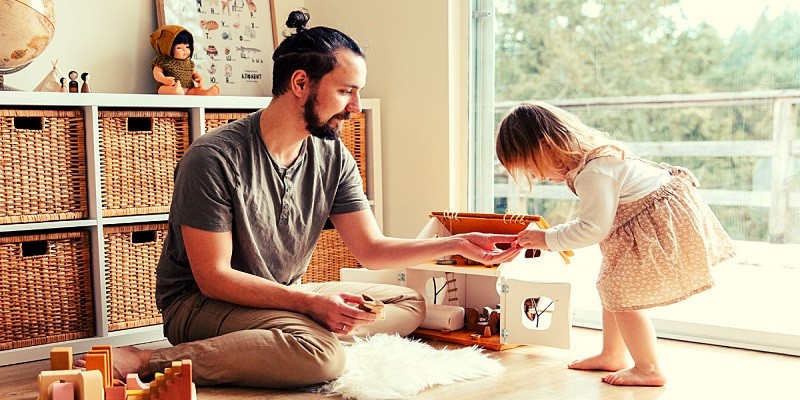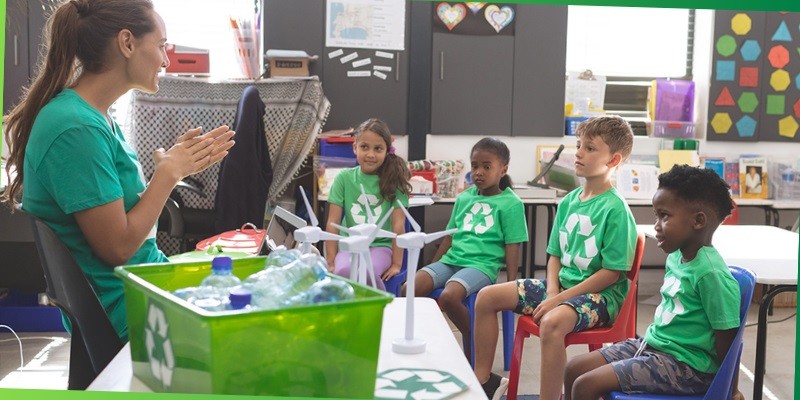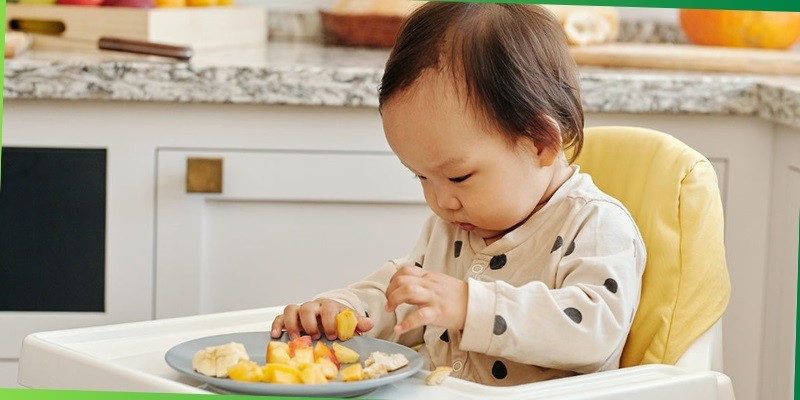Last Updated on June 6, 2023
Montessori parenting is an approach to raising children that is based on the teachings of dr. maria montessori. It emphasizes independence, respect for the child, and a prepared environment that fosters learning.
As parents, we all want the best for our children. We want them to grow up to be happy, responsible, and capable adults. Montessori parenting is a philosophy that can help us achieve these goals by providing a framework for how we interact with our children on a daily basis.
The montessori approach views children as individuals with unique needs and interests, and seeks to foster their natural curiosity and love of learning. This is done by creating an environment that is safe, engaging, and empowering, and by encouraging independence and responsibility from an early age. In this article, we will explore the principles of montessori parenting, and provide tips and strategies for incorporating them into your own family life.

Credit: montessori-academy.com
What Is Montessori Parenting?
Have you ever heard of montessori parenting? It’s a parenting philosophy that emphasizes a child’s independence and learning through sensory experiences. Developed by dr. maria montessori, an italian physician, in the early 1900s, montessori parenting has garnered attention for its unique approach.
Below, we will discuss the principles and approach, the brief history, as well as the benefits of montessori parenting for children’s development.
Brief History Of Montessori Parenting
- Dr. maria montessori developed the montessori approach in the early 1900s, with a focus on educating underprivileged children in rome.
- Montessori’s educational approach gained popularity, and her ideas on parenting and education started spreading worldwide in the 1960s.
- Today, there are montessori schools and parenting practices in countries around the world.
The Principles And Approach Of Montessori Parenting
- Montessori parenting emphasizes a child’s independence and encourages a child to take an active role in their learning.
- The montessori approach revolves around a prepared environment where children can freely explore and learn at their own pace.
- The approach also emphasizes sensory experiences, with an emphasis on hands-on, experiential learning.
The Benefits Of Montessori Parenting For Children’S Development
- The montessori approach has been linked to improved social skills, self-confidence, and a love of learning in children.
- By encouraging children to explore and learn independently, montessori parenting can help children develop problem-solving and critical-thinking skills.
- In addition, the focus on hands-on, sensory experiences can enhance a child’s creativity and help them develop a deep understanding of the world around them.
Montessori parenting is a unique approach to childhood development, and its principles and methods have helped many children around the world achieve success and develop a love of learning. By encouraging independence, hands-on learning, and experiential learning, montessori parenting can help children thrive in many areas of their lives.
Implementing The Montessori Method At Home
Montessori parenting is a popular approach that emphasizes children’s independence, self-directed learning, and a love of learning. This method was developed by maria montessori a hundred years ago and has been proven to be effective in nurturing happy and intelligent children.
Implementing the montessori method at home is all about preparing an environment for children to learn and explore, incorporating play-based learning activities, encouraging children’s independence and self-directed learning, fostering a love of learning and appreciation for nature, and applying montessori techniques to different age groups.
In this section, we will discuss each of these elements in detail.
Prepare An Environment For Children To Learn And Explore:
- Create a designated area in your home where your child can play and learn without distractions.
- Choose age-appropriate activities and toys, and rotate them regularly to keep your child engaged and interested.
- Provide access to natural materials like wood, cotton, and wool, as well as sensory activities like sand, water, and clay.
- Offer tools that encourage exploration, such as magnifying glasses, binoculars, and maps to encourage scientific exploration and curiosity.
Incorporate Play-Based Learning Activities:
- Learning through play is crucial for children’s development.
- Identify your child’s interests and provide a wide variety of activities to nurture those interests.
- Montessori activities typically include practical life skills, such as pouring, scooping, and sorting.
- Use recycled materials as much as possible, and let your child lead and explore at his or her pace.
Encourage Children’S Independence And Self-Directed Learning:
- Allow your child to make choices and decisions, even if they make mistakes.
- Give children time to explore and experiment, and allow failures without ridicule.
- Encourage independent thought instead of relying on rewards or praise.
- Foster a sense of responsibility by giving simple tasks to accomplish.
Foster A Love Of Learning And Appreciation For Nature:
- Encourage children to explore and experience the natural world.
- Take regular trips outside, go on hikes, and explore the local environment.
- Provide opportunities for children to develop a deeper understanding of the environment and their place in it.
- Read books and watch documentaries about different cultures and environments.
Tips For Applying Montessori Techniques To Different Age Groups:
- For infants, provide wooden toys and natural materials and rotate toys to keep infants busy.
- Provide a low shelf with a few toys and offer plenty of unstructured playtime.
- Toddlers thrive in environments that promote hands-on exploration, practical life skills, and self-determined learning.
- Preschoolers can benefit from language, literacy, math, and practical life skills, and should be encouraged to explore the surrounding world.
Montessori parenting is an excellent way to foster early learning and independence in children, and these techniques can be tailored to suit children of all ages. By providing a nurturing and supportive environment for children to learn and explore, parents can lay the foundation for academic, social, and emotional success that will last a lifetime.
Comparing Montessori Parenting With Conventional Parenting
Montessori parenting is a philosophy that centers around child-led learning, respect for the child, and fostering independence from a very early age. Many parents today recognize the rigid and controlling nature of conventional parenting and are opting for a different approach.
But what makes montessori parenting stand out? ###
Differences In The Educational Philosophy And Approach
Montessori education places a great deal of emphasis on independence and hands-on experience. It encourages children to learn at their own pace, and places them in a prepared environment that facilitates their development. Conventional education, on the other hand, is more structured, sometimes with rote memorization and passive learning.
The Role Of The Adult And Child In Montessori Parenting
In montessori parenting, the adult acts as a guide as opposed to a teacher. The child is respected and able to explore his or her environment freely, with the adult offering gentle guidance when needed. On the other hand, conventional parenting places the adult in an authoritarian role where they direct nearly every aspect of the child’s life, including academic, personal, and social development.
How Montessori Parenting Encourages Holistic Development Of The Child
Montessori parenting views the child as a holistic being, with the physical, emotional, social, and cognitive aspects of development being equally important. It recognizes that each child is unique and has different needs, and therefore tailors the approach to meet the child’s individual needs.
As a result, children in montessori programs tend to be more well-rounded, confident, and capable than children exposed to conventional schooling.
The Impact Of Montessori Parenting On Children’S Social And Emotional Growth
Montessori parenting emphasizes respect, empathy, and community-building. Children in montessori programs tend to exhibit a greater sense of empathy towards others, can work well in a team, and are more socially adept compared to those in traditional schooling. This approach is vital in today’s world, where social intelligence is just as important as academic aptitude.
Real-Life Examples And Success Stories Of Montessori Parenting
Numerous montessori success stories and evidence exist, proving the effectiveness of montessori education in empowering children and supporting their development. For instance, google’s founders, larry page and sergey brin, credit their success partly to their montessori education. Other famous figures, such as jeff bezos, prince william, and gabriel garcia marquez, all attribute their success to montessori education.
Montessori parenting takes a different approach than conventional parenting. Its focus on independence, respect, and child-led learning, coupled with a holistic approach to development, has resulted in an education method that has proven to be very effective in promoting well-rounded and capable children.
Practical Examples And Case Studies
A Day In The Life Of A Montessori Parent And Child
Montessori parenting is designed to prepare children for the challenges of everyday life by encouraging their independence and creativity. Here is an example of what a day in the life of a montessori parent and child looks like:
- The day begins with the child waking up on their own, without any alarms or adults waking them up.
- The child then dresses themselves, picks out their own breakfast, and prepares it with minimal assistance.
- After breakfast, the child helps with household chores such as cleaning and organizing their toys and clothing.
- The child then engages in independent play, exploring their environment, and learning through activities such as pouring, sorting, and matching.
- The parent encourages the child’s interests, offers guidance, and provides a safe and stimulating environment.
- The child also has time for outdoor play, exercise, and socialization with other children.
- Bedtime is an unhurried and predictable process, with the child taking responsibility for their personal hygiene and selecting their own bedtime story.
Success Stories And Case Studies From Real Montessori Families
Here are some inspiring success stories and case studies from real montessori families:
- One parent reported that their child began to prepare their own meals, including chopping vegetables and using kitchen tools safely, at the age of three.
- Another said their child learned to read and write by the age of four with minimal assistance, as montessori education focuses on individualized learning at the child’s pace.
- A montessori family reported that their child developed a deep love of nature and a respect for the environment, as the approach emphasizes the connection between the child and their surroundings.
- Others have observed their children becoming more independent, confident, and creative over time, as they are trusted to make decisions and explore their interests in a supportive environment.
Q & A With Montessori Parents And Children
Here are some common questions and answers from montessori parents and children:
- Q: How does montessori differ from traditional education?
- A: Montessori education emphasizes individualized learning, practical life skills, and a holistic approach to child development.
- Q: How can i implement montessori principles at home?
- A: Encourage your child’s independence, provide a prepared environment, offer choices and respect their decisions, and observe and follow their interests.
- Q: What are some common challenges in montessori parenting?
- A: Parents may struggle with letting go of control, accommodating the child’s pace of learning, and providing a safe and stimulating environment.
Common Challenges And How To Overcome Them In Montessori Parenting
Here are some common challenges in montessori parenting and strategies for overcoming them:
- Challenge: The child may take longer to complete tasks than expected.
- Solution: Trust the child’s process and allow them the time they need to complete tasks at their own pace.
- Challenge: The child may resist or reject certain activities or materials.
- Solution: Offer choices, observe and follow the child’s interests, and be patient and persistent.
- Challenge: Parents may struggle with the lack of structure or formal lesson plans.
- Solution: Embrace the child-led approach and trust that they will learn through exploration and self-directed activities.
- Challenge: Parents may feel overwhelmed and unsure how to implement montessori principles at home.
- Solution: Seek guidance and support from montessori resources, observe and reflect on the child’s needs and interests, and focus on small changes and adjustments.
Frequently Asked Questions Of What Is Montessori Parenting?
What Is Montessori Parenting?
Montessori parenting is a child-centered method that encourages independence, curiosity, and self-discipline.
What Are The Benefits Of Montessori Parenting?
The benefits of montessori parenting include fostering independence, creativity, and cognitive development in children.
How Can I Incorporate Montessori Principles At Home?
You can incorporate montessori principles at home by creating a prepared environment, promoting independence, and encouraging self-directed exploration.
Is Montessori Parenting Right For Every Family?
Montessori parenting may not be suitable for every family. It depends on your parenting style, values, and temperament of the child.
How Does Montessori Parenting Differ From Traditional Parenting?
Montessori parenting differs from traditional parenting in its emphasis on child-led learning and independence rather than rewards and punishments.
Conclusion
As we conclude this blog post, it’s essential to remember that montessori parenting isn’t a one-size-fits-all approach. It’s up to the parents to find what works best for them and their children based on their unique needs and personalities. Montessori parenting teaches children to become independent, compassionate, and responsible individuals who can think critically.
You don’t need to follow this parenting method religiously to gain from it. Incorporating some of the principles of montessori methods into your parenting style will go a long way in fostering a positive and supportive environment for your children to thrive in.
Finally, seek a partnership with your child’s teachers to ensure consistency between home and school and to give your children the best opportunity for success both personally and academically.







